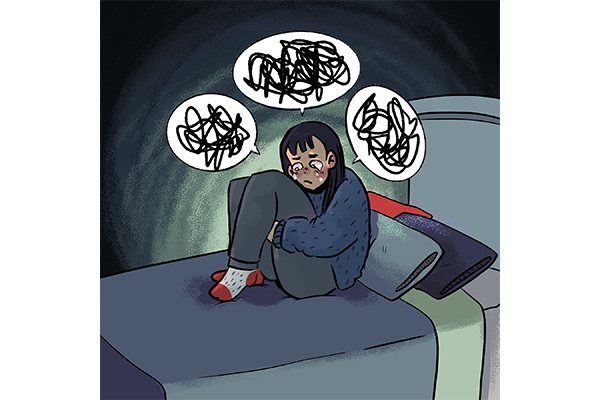He said his symptoms often lasted for hours and occurred when he thought about things related to the pandemic, such as how he was going to meet new people on campus while avoiding in-person events and gatherings.
“It’s kind of like — I get to my dream school, but I still have to wait maybe a year or even more to experience the connections I wanted to have from the beginning,” Santiago said. “(You) keep pushing back on those feelings, (but they) find a way to be coming back to you.”
As a new semester begins, many UT students like Santiago say the pandemic has taken a toll on their mental health. At UT’s Counseling and Mental Health Center, the number of attended counseling sessions increased by about 38% from last summer to this summer, said Katy Redd, associate director for prevention, development and media relations at the CMHC.
“We did have a busier summer at CMHC than we typically would have,” Redd said. “Of course, there’s perhaps a variety of reasons for that. We have been seeing students via telehealth exclusively since mid-March and will continue to do that through the fall.”
Stress, anxiety and depression are the most common reasons students come to the CMHC, Redd said. When stress becomes overwhelming, she said one’s performance decreases, making them unable to keep up with regular activities.
Lauren Breach, a human development and family sciences sophomore, said being isolated during the pandemic has worsened her diagnosed depression and anxiety. She opted for all online classes this fall, and has been staying by herself in an apartment near campus. She said it’s been lonely.
“There’s less validation in your life,” Breach said. “It’s easy to start feeling like you don’t have a support system, even if you do, because you don’t see them.”
Breach said her recent symptoms have made school more difficult. For example, sometimes she finds it hard to wake up for her early Zoom classes.
“I have a 9 a.m. class every day, and sometimes, I don’t go to that 9 a.m.,” Breach said. “That’s something I wouldn’t do normally.”
Charles Nemeroff, UT psychiatry department chair and professor, said absent a pandemic, depression probably has a 5% to 7% prevalence in college-age individuals. He said anxiety disorders — particularly social anxiety disorder, panic disorder and generalized anxiety disorder — are also relatively common in the age group.
Nemeroff said there are three groups of people who could develop mood or anxiety disorders during the pandemic: people who have previously had these disorders, people who are genetically vulnerable to these disorders but have never had them before, and everyone else.
“All of us, whether we’re vulnerable or not, have a tipping point, so given enough stress, all of us can develop mood and anxiety symptoms, if not the disorder,” Nemeroff said.
Nemeroff said college students are particularly vulnerable to developing mood and anxiety symptoms right now. Students might experience Zoom fatigue or uncertainty about COVID-19 cases on campus, freshmen will deal with the demand for social isolation on top of other stresses associated with being a new student, and seniors face challenges such as interviewing for jobs over Zoom, he said.
Santiago’s stress and anxiety has continued during his time on campus, intruding as he completes schoolwork and meets new people. He’s made a few friends through his roommate, successfully avoiding larger gatherings. But when he spends time with them, the pandemic still weighs on his mind.
“The fact that there’s COVID makes it harder,” Santiago said. “Like, ‘Should I be doing it?’ ‘Am I taking care of myself?’ ‘Am I risking other people’s health?’”
Sam, a computer science major, said he experienced loneliness similar to Breach’s during the online portion of UT’s spring semester and the summer while he stayed at home with his parents. He’d also been previously diagnosed with anxiety and depression, and his symptoms worsened as he spent most of his time alone in his bedroom — sitting in Zoom calls and checking social media.
Sam has since returned to campus and said he plans to meet with a therapist about his recent symptoms.
“It’s been kind of hard and tedious to try to find someone that accepts insurance and has time open, but that’s something I feel like I need to do,” Sam said.
Nationally, adults in the United States ages 18 to 65+ reported elevated levels of adverse mental health conditions, substance use and suicidal ideation in June, according to a report released in August by the Centers for Disease Control and Prevention.
According to the report, which included findings from a survey of 5,470 adults conducted June 24-30, the prevalence of anxiety symptoms was approximately three times those reported in the second quarter of 2019, and prevalence of depression was approximately four times as high.
Redd said recommendations for students experiencing mental health issues vary greatly from person to person. She recommends students recognize that normal coping mechanisms may not be available to them right now, unplug from social media or create a more positive at-home workspace.
“Some of the things that we would always recommend are things like social connections, mindfulness, gratitude,” Redd said. “Those things still work, but I think we have to just be really intentional right now about that.”
If a student is struggling, Redd recommends they schedule a 10- to 15-minute chat with the CMHC’s brief assessment and referral team to figure out which of the center’s services or community resources might work best.
Breach said she’s been meeting with a therapist since before the pandemic, and she recommends others get support during this time.
“I really advocate that for anyone,” Breach said. “There’s different levels of mental health struggles, and even if you’re not on that far end of the spectrum, you can still get help.”
Editor’s note: Santiago asked that his last name be withheld. Sam’s name has been changed for privacy.



